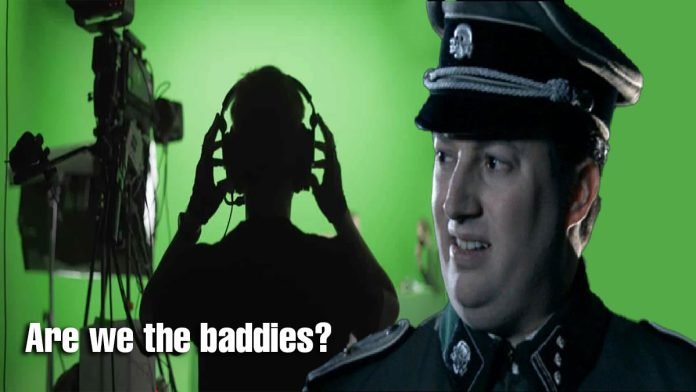Journalists and the mainstream media should ask the question – “Are we the baddies?”
The incestuous relationship between mainstream media and power is not unique to the United States. As Caitlin Johnstone highlights, the cosy dynamic between journalists and politicians permeates Western media, including British outlets.
Johnstone traces how the composition of newsrooms has evolved to overrepresent elite circles. Where working-class perspectives once diversified coverage, now Ivy League and Oxbridge dominate. And proximity breeds sympathy. The old adversarial dynamic between reporters and officials has melted into an “us vs. them” mentality where journalists identify more with their well-heeled subjects than their readers.
Add incentives to echo official narratives, and worldviews warp. Nonconformists get filtered out of the system. Telegraph and Times alums control messaging like NYT and WaPo grads across the pond. The end result is the same – a media ecosystem that acts as propaganda arm for the powerful.
The context may differ, but the UK faces the same crisis of perspective that plagues US media. And it will take equally bold solutions to bring balance back to the British press.
Caitlin Johnstone: Mainstream Journalists
It’s not just the obscenely wealthy owners of the mass media who are protecting their class interests — it’s the reporters, editors and pundits as well.
Iraq war cheerleader David Brooks’ article in The New York Times, “What if We’re the Bad Guys Here?” is another one of those tired old think pieces we’ve been seeing for the last eight years that asks, “Golly gosh could we coastal elites have played some role in the rise of Trumpism?” as if it’s the first time anyone has ever considered that obvious point.
One worthwhile paragraph about the media stands out though:
“Over the last decades, we’ve taken over whole professions and locked everybody else out. When I began my journalism career in Chicago in the 1980s, there were still some old crusty working-class guys around the newsroom. Now we’re not only a college-dominated profession, we’re an elite-college-dominated profession. Only 0.8 percent of all college students graduate from the super elite 12 schools (the Ivy League colleges, plus Stanford, M.I.T., Duke and the University of Chicago). A 2018 study found that more than 50 percent of the staff writers at the beloved New York Times and The Wall Street Journal attended one of the 29 most elite universities in the nation.”
We in the educated class are always publicly speaking out for the marginalized, but somehow we always end up building systems that serve ourselves. https://t.co/vLGHYGKcse
— David Brooks (@nytdavidbrooks) August 2, 2023
Brooks is not the first to make this observation about the drastic shift in the socioeconomic makeup of news reporters that has taken place from previous generations to now.
“The class factor in journalism gets overlooked,” journalist Glenn Greenwald said on the Jimmy Dore Show in 2021.
“Thirty or 40 years ago, 50 years ago, journalists really were outsiders. That’s why they all had unions; they made shit money, they came from like working class families. They hated the elite. They hated bankers and politicians. It was kind of like a boss-employee relationship — they hated them and wanted to throw rocks at them and take them down pegs.”
“If I were to list the 20 richest people I’ve ever met in my entire life, I think like seven or eight of them are people I met because they work at The Intercept — people from like the richest fucking families on the planet,” Greenwald added.
Journalist Matt Taibbi, whose father worked for NBC, made similar observations on the Dark Horse podcast back in 2020.
“Reporters when I was growing up, they came from a different class of people than they do today,” Taibbi said.
“A lot of them were kind of more working class — their parents were more likely to be plumbers or electricians than they were to be doctors or lawyers. Like this thing where the journalist is an Ivy League grad, that’s a relatively new thing that I think came about in the seventies and eighties with my generation. But reporters just instinctively hated rich people, they hated powerful people. Like if you put up a poster of a politician in a newsroom it was defaced instantaneously, like there were darts on it. Reporters saw it as their job to stick it to the man.”
“Mostly the job is different now,” Taibbi said, adding:
“The fantasy among reporters in the nineties about politicians started to be, I want to be the person that hangs out with the candidate after the speech and has a beer and is sort of close to power. And that’s kind of the model, that’s where we’re at right now. That’s kind of the problem is that basically people in the business want to be behind the rope line with people of influence. And it’s going to be a problem to get us back to that other adversarial posture of the past.”
This is a major reason behind the freakish sycophancy and empire loyalism we see in the mainstream press. It’s not just the obscenely wealthy owners of the mass media who are protecting their class interests — it’s the reporters, editors and pundits as well.
These are typically fairly wealthy people from fairly wealthy families, who become more and more wealthy the more their careers are elevated. As insiders of the mainstream press have attested, it’s widely understood by employees of the mainstream media that the way to elevate your career is to toe the establishment line and refrain from spotlighting issues that are inconvenient to the powerful.
This identification with the ruling class feeds into the dynamic described by Taibbi in which modern journalists have come to value close proximity to those in power.
These are the people they want to be sharing drinks with and going to parties with and invited to the weddings of; the “us vs them” dynamic which used to exist between the press and politicians switched, and now the press see themselves and the politicians they fraternize with as “us” and the general public as “them”.
There are other factors at play with regard to elite education. The number of journalists with college degrees skyrocketed from 58 percent in 1971 to 92 percent in 2013; if your wealthy parents aren’t paying that off for you then you’ve got crushing student debt that you need to pay off yourself, which you can only do in the field you studied in by making a decent amount of money, which you can only do by acting as a dependable propagandist for the imperial establishment.
Universities themselves tend to play a status quo-serving, conformity-manufacturing role when churning out journalists, as wealth won’t flow into an academic environment that is offensive to the wealthy.
Moneyed interests are unlikely to make large donations to universities which teach their students that moneyed interests are a plague upon the nation, and they are certainly not going to send their kids there.
“The whole intellectual culture has a filtering system, starting as a child in school,” Noam Chomsky once explained in an interview.
“You’re expected to accept certain beliefs, styles, behavioural patterns and so on. If you don’t accept them, you are called maybe a behavioural problem, or something, and you’re weeded out. Something like that goes on all the way through universities and graduate schools. There is an implicit system of filtering… which creates a strong tendency to impose conformism.”
The people who make it through this filtering system are the ones who are elevated to the most influential positions in our civilization.
All the most widely amplified voices in our society are the celebrities, journalists, pundits and politicians who’ve proven themselves to be reliable stewards of the matrix of narrative control which keeps the public jacked in to the mainstream worldview.
Is it any wonder, then, that all the sources we’ve been taught to look to for information continually feed us stories which give the impression that the status quo is working fine and this is the only way things can possibly be?
Is it any wonder that the mass media support all U.S. wars and cheerlead all imperial agendas?
This is how things were set up to be. Our media act like propagandists for a tyrannical regime because that’s exactly what they are.
Caitlin Johnstone’s work is entirely reader-supported, so if you enjoyed this piece please consider sharing it around, following her on… Facebook, Twitter, Soundcloud, YouTube, or throwing some money into her tip jar on Ko-fi, Patreon or Paypal.
If you want to read more you can buy her books. The best way to make sure you see the stuff she publishes is to subscribe to the mailing list at her website or on Substack, which will get you an email notification for everything she publishes.
For more info on who she is, where she stands and what she’s trying to do with her platform, click here. All works are co-authored with her American husband Tim Foley.
This article is from CaitlinJohnstone.com and re-published with permission.
The views expressed are solely those of the author and may or may not reflect those of Labour Hearrtlands
Support Independent Journalism Today
Our unwavering dedication is to provide you with unbiased news, diverse perspectives, and insightful opinions. We're on a mission to ensure that those in positions of power are held accountable for their actions, but we can't do it alone. Labour Heartlands is primarily funded by me, Paul Knaggs, and by the generous contributions of readers like you. Your donations keep us going and help us uphold the principles of independent journalism. Join us in our quest for truth, transparency, and accountability – donate today and be a part of our mission!
Like everyone else, we're facing challenges, and we need your help to stay online and continue providing crucial journalism. Every contribution, no matter how small, goes a long way in helping us thrive. By becoming one of our donors, you become a vital part of our mission to uncover the truth and uphold the values of democracy.
While we maintain our independence from political affiliations, we stand united against corruption, injustice, and the erosion of free speech, truth, and democracy. We believe in the power of accurate information in a democracy, and we consider facts non-negotiable.
Your support, no matter the amount, can make a significant impact. Together, we can make a difference and continue our journey toward a more informed and just society.
Thank you for supporting Labour Heartlands













